ENTREPRENEURSHIP Report: Ventures, Data, and Successful Traits
VerifiedAdded on 2021/01/02
|17
|5330
|310
Report
AI Summary
This report delves into the dynamic field of entrepreneurship and small business management, examining various types of entrepreneurial ventures, including sole proprietorships, partnerships, and corporations, as well as large company and social entrepreneurship models. It explores the similarities and differences between small businesses and start-ups, highlighting aspects such as scale, funding, and exit strategies. The report analyzes the impact of small businesses on the economy, emphasizing their contribution to employment, innovation, and competitiveness. It also identifies the key characteristics, traits, and skills of successful entrepreneurs, along with how background and experience can influence entrepreneurial motivation and mind-set. The report offers practical examples from mini-research and assesses relevant data and statistics related to the impact of small businesses on a country's economy, including their role in providing opportunities, encouraging innovation, and generating employment. The report also analyzes the contribution, competitiveness of small businesses and how they contribute to the economic growth.

ENTREPRENEURSHIP
Paraphrase This Document
Need a fresh take? Get an instant paraphrase of this document with our AI Paraphraser

Table of Contents
INTRODUCTION...........................................................................................................................1
P 1. Examine different types of entrepreneurial ventures......................................................1
P 2 Explore the similarities and differences between entrepreneurial ventures.....................4
P 3. Assess and interpret relevant data and statistics..............................................................6
P 4 Explain how important small businesses and business start –ups....................................7
P 5 Determine the characteristics, traits and skills of two successful entrepreneurs.............8
P 6 aspects of the entrepreneurial personality as discussed in P 5, reflect entrepreneurial
motivation and mind-set.......................................................................................................11
P 7. With practical examples obtained through your mini-research, examine how background
and experience can hinder or foster entrepreneurship..........................................................12
CONCLUSION..............................................................................................................................12
REFERENCES..............................................................................................................................14
INTRODUCTION...........................................................................................................................1
P 1. Examine different types of entrepreneurial ventures......................................................1
P 2 Explore the similarities and differences between entrepreneurial ventures.....................4
P 3. Assess and interpret relevant data and statistics..............................................................6
P 4 Explain how important small businesses and business start –ups....................................7
P 5 Determine the characteristics, traits and skills of two successful entrepreneurs.............8
P 6 aspects of the entrepreneurial personality as discussed in P 5, reflect entrepreneurial
motivation and mind-set.......................................................................................................11
P 7. With practical examples obtained through your mini-research, examine how background
and experience can hinder or foster entrepreneurship..........................................................12
CONCLUSION..............................................................................................................................12
REFERENCES..............................................................................................................................14
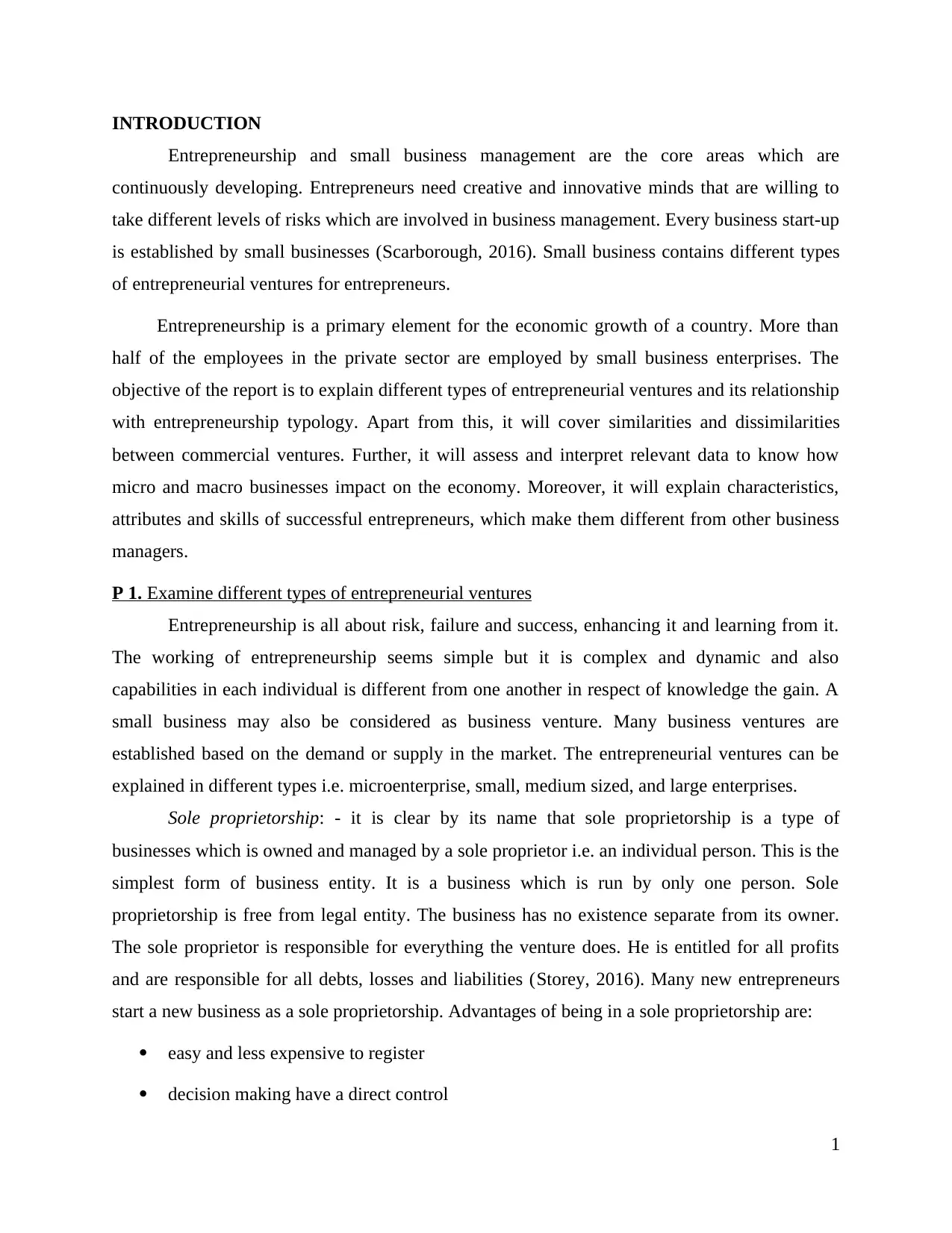
INTRODUCTION
Entrepreneurship and small business management are the core areas which are
continuously developing. Entrepreneurs need creative and innovative minds that are willing to
take different levels of risks which are involved in business management. Every business start-up
is established by small businesses (Scarborough, 2016). Small business contains different types
of entrepreneurial ventures for entrepreneurs.
Entrepreneurship is a primary element for the economic growth of a country. More than
half of the employees in the private sector are employed by small business enterprises. The
objective of the report is to explain different types of entrepreneurial ventures and its relationship
with entrepreneurship typology. Apart from this, it will cover similarities and dissimilarities
between commercial ventures. Further, it will assess and interpret relevant data to know how
micro and macro businesses impact on the economy. Moreover, it will explain characteristics,
attributes and skills of successful entrepreneurs, which make them different from other business
managers.
P 1. Examine different types of entrepreneurial ventures
Entrepreneurship is all about risk, failure and success, enhancing it and learning from it.
The working of entrepreneurship seems simple but it is complex and dynamic and also
capabilities in each individual is different from one another in respect of knowledge the gain. A
small business may also be considered as business venture. Many business ventures are
established based on the demand or supply in the market. The entrepreneurial ventures can be
explained in different types i.e. microenterprise, small, medium sized, and large enterprises.
Sole proprietorship: - it is clear by its name that sole proprietorship is a type of
businesses which is owned and managed by a sole proprietor i.e. an individual person. This is the
simplest form of business entity. It is a business which is run by only one person. Sole
proprietorship is free from legal entity. The business has no existence separate from its owner.
The sole proprietor is responsible for everything the venture does. He is entitled for all profits
and are responsible for all debts, losses and liabilities (Storey, 2016). Many new entrepreneurs
start a new business as a sole proprietorship. Advantages of being in a sole proprietorship are:
easy and less expensive to register
decision making have a direct control
1
Entrepreneurship and small business management are the core areas which are
continuously developing. Entrepreneurs need creative and innovative minds that are willing to
take different levels of risks which are involved in business management. Every business start-up
is established by small businesses (Scarborough, 2016). Small business contains different types
of entrepreneurial ventures for entrepreneurs.
Entrepreneurship is a primary element for the economic growth of a country. More than
half of the employees in the private sector are employed by small business enterprises. The
objective of the report is to explain different types of entrepreneurial ventures and its relationship
with entrepreneurship typology. Apart from this, it will cover similarities and dissimilarities
between commercial ventures. Further, it will assess and interpret relevant data to know how
micro and macro businesses impact on the economy. Moreover, it will explain characteristics,
attributes and skills of successful entrepreneurs, which make them different from other business
managers.
P 1. Examine different types of entrepreneurial ventures
Entrepreneurship is all about risk, failure and success, enhancing it and learning from it.
The working of entrepreneurship seems simple but it is complex and dynamic and also
capabilities in each individual is different from one another in respect of knowledge the gain. A
small business may also be considered as business venture. Many business ventures are
established based on the demand or supply in the market. The entrepreneurial ventures can be
explained in different types i.e. microenterprise, small, medium sized, and large enterprises.
Sole proprietorship: - it is clear by its name that sole proprietorship is a type of
businesses which is owned and managed by a sole proprietor i.e. an individual person. This is the
simplest form of business entity. It is a business which is run by only one person. Sole
proprietorship is free from legal entity. The business has no existence separate from its owner.
The sole proprietor is responsible for everything the venture does. He is entitled for all profits
and are responsible for all debts, losses and liabilities (Storey, 2016). Many new entrepreneurs
start a new business as a sole proprietorship. Advantages of being in a sole proprietorship are:
easy and less expensive to register
decision making have a direct control
1
⊘ This is a preview!⊘
Do you want full access?
Subscribe today to unlock all pages.

Trusted by 1+ million students worldwide
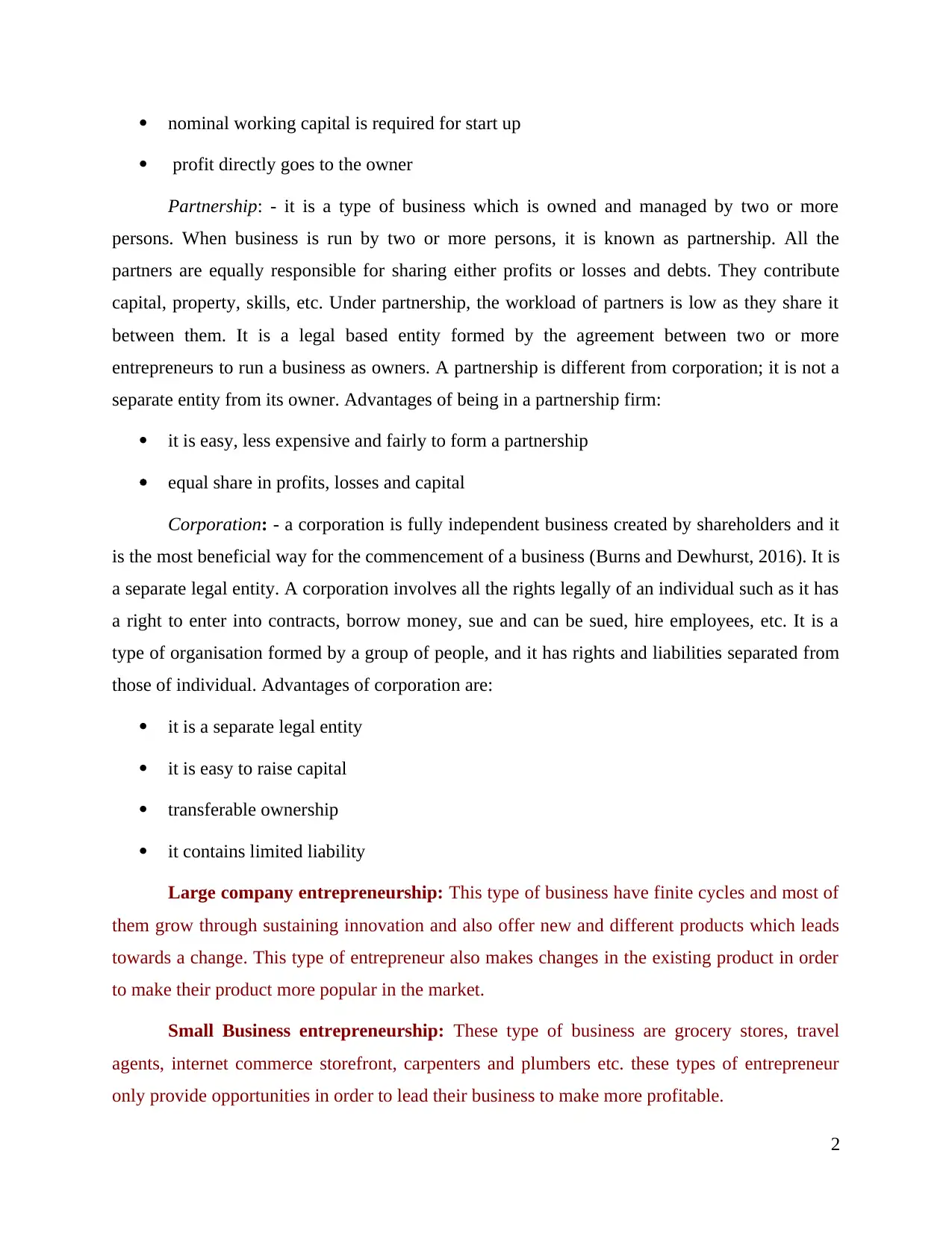
nominal working capital is required for start up
profit directly goes to the owner
Partnership: - it is a type of business which is owned and managed by two or more
persons. When business is run by two or more persons, it is known as partnership. All the
partners are equally responsible for sharing either profits or losses and debts. They contribute
capital, property, skills, etc. Under partnership, the workload of partners is low as they share it
between them. It is a legal based entity formed by the agreement between two or more
entrepreneurs to run a business as owners. A partnership is different from corporation; it is not a
separate entity from its owner. Advantages of being in a partnership firm:
it is easy, less expensive and fairly to form a partnership
equal share in profits, losses and capital
Corporation: - a corporation is fully independent business created by shareholders and it
is the most beneficial way for the commencement of a business (Burns and Dewhurst, 2016). It is
a separate legal entity. A corporation involves all the rights legally of an individual such as it has
a right to enter into contracts, borrow money, sue and can be sued, hire employees, etc. It is a
type of organisation formed by a group of people, and it has rights and liabilities separated from
those of individual. Advantages of corporation are:
it is a separate legal entity
it is easy to raise capital
transferable ownership
it contains limited liability
Large company entrepreneurship: This type of business have finite cycles and most of
them grow through sustaining innovation and also offer new and different products which leads
towards a change. This type of entrepreneur also makes changes in the existing product in order
to make their product more popular in the market.
Small Business entrepreneurship: These type of business are grocery stores, travel
agents, internet commerce storefront, carpenters and plumbers etc. these types of entrepreneur
only provide opportunities in order to lead their business to make more profitable.
2
profit directly goes to the owner
Partnership: - it is a type of business which is owned and managed by two or more
persons. When business is run by two or more persons, it is known as partnership. All the
partners are equally responsible for sharing either profits or losses and debts. They contribute
capital, property, skills, etc. Under partnership, the workload of partners is low as they share it
between them. It is a legal based entity formed by the agreement between two or more
entrepreneurs to run a business as owners. A partnership is different from corporation; it is not a
separate entity from its owner. Advantages of being in a partnership firm:
it is easy, less expensive and fairly to form a partnership
equal share in profits, losses and capital
Corporation: - a corporation is fully independent business created by shareholders and it
is the most beneficial way for the commencement of a business (Burns and Dewhurst, 2016). It is
a separate legal entity. A corporation involves all the rights legally of an individual such as it has
a right to enter into contracts, borrow money, sue and can be sued, hire employees, etc. It is a
type of organisation formed by a group of people, and it has rights and liabilities separated from
those of individual. Advantages of corporation are:
it is a separate legal entity
it is easy to raise capital
transferable ownership
it contains limited liability
Large company entrepreneurship: This type of business have finite cycles and most of
them grow through sustaining innovation and also offer new and different products which leads
towards a change. This type of entrepreneur also makes changes in the existing product in order
to make their product more popular in the market.
Small Business entrepreneurship: These type of business are grocery stores, travel
agents, internet commerce storefront, carpenters and plumbers etc. these types of entrepreneur
only provide opportunities in order to lead their business to make more profitable.
2
Paraphrase This Document
Need a fresh take? Get an instant paraphrase of this document with our AI Paraphraser
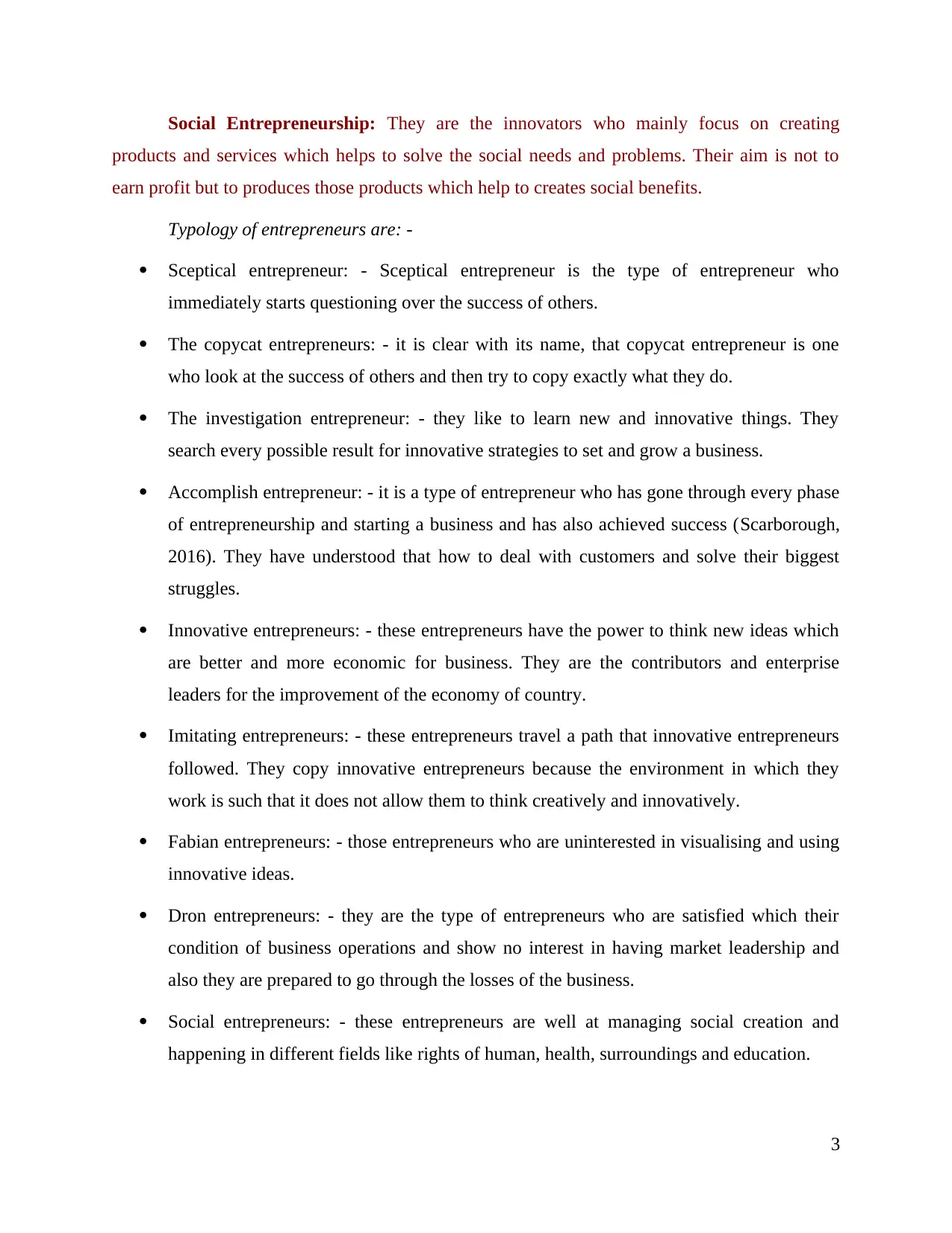
Social Entrepreneurship: They are the innovators who mainly focus on creating
products and services which helps to solve the social needs and problems. Their aim is not to
earn profit but to produces those products which help to creates social benefits.
Typology of entrepreneurs are: -
Sceptical entrepreneur: - Sceptical entrepreneur is the type of entrepreneur who
immediately starts questioning over the success of others.
The copycat entrepreneurs: - it is clear with its name, that copycat entrepreneur is one
who look at the success of others and then try to copy exactly what they do.
The investigation entrepreneur: - they like to learn new and innovative things. They
search every possible result for innovative strategies to set and grow a business.
Accomplish entrepreneur: - it is a type of entrepreneur who has gone through every phase
of entrepreneurship and starting a business and has also achieved success (Scarborough,
2016). They have understood that how to deal with customers and solve their biggest
struggles.
Innovative entrepreneurs: - these entrepreneurs have the power to think new ideas which
are better and more economic for business. They are the contributors and enterprise
leaders for the improvement of the economy of country.
Imitating entrepreneurs: - these entrepreneurs travel a path that innovative entrepreneurs
followed. They copy innovative entrepreneurs because the environment in which they
work is such that it does not allow them to think creatively and innovatively.
Fabian entrepreneurs: - those entrepreneurs who are uninterested in visualising and using
innovative ideas.
Dron entrepreneurs: - they are the type of entrepreneurs who are satisfied which their
condition of business operations and show no interest in having market leadership and
also they are prepared to go through the losses of the business.
Social entrepreneurs: - these entrepreneurs are well at managing social creation and
happening in different fields like rights of human, health, surroundings and education.
3
products and services which helps to solve the social needs and problems. Their aim is not to
earn profit but to produces those products which help to creates social benefits.
Typology of entrepreneurs are: -
Sceptical entrepreneur: - Sceptical entrepreneur is the type of entrepreneur who
immediately starts questioning over the success of others.
The copycat entrepreneurs: - it is clear with its name, that copycat entrepreneur is one
who look at the success of others and then try to copy exactly what they do.
The investigation entrepreneur: - they like to learn new and innovative things. They
search every possible result for innovative strategies to set and grow a business.
Accomplish entrepreneur: - it is a type of entrepreneur who has gone through every phase
of entrepreneurship and starting a business and has also achieved success (Scarborough,
2016). They have understood that how to deal with customers and solve their biggest
struggles.
Innovative entrepreneurs: - these entrepreneurs have the power to think new ideas which
are better and more economic for business. They are the contributors and enterprise
leaders for the improvement of the economy of country.
Imitating entrepreneurs: - these entrepreneurs travel a path that innovative entrepreneurs
followed. They copy innovative entrepreneurs because the environment in which they
work is such that it does not allow them to think creatively and innovatively.
Fabian entrepreneurs: - those entrepreneurs who are uninterested in visualising and using
innovative ideas.
Dron entrepreneurs: - they are the type of entrepreneurs who are satisfied which their
condition of business operations and show no interest in having market leadership and
also they are prepared to go through the losses of the business.
Social entrepreneurs: - these entrepreneurs are well at managing social creation and
happening in different fields like rights of human, health, surroundings and education.
3
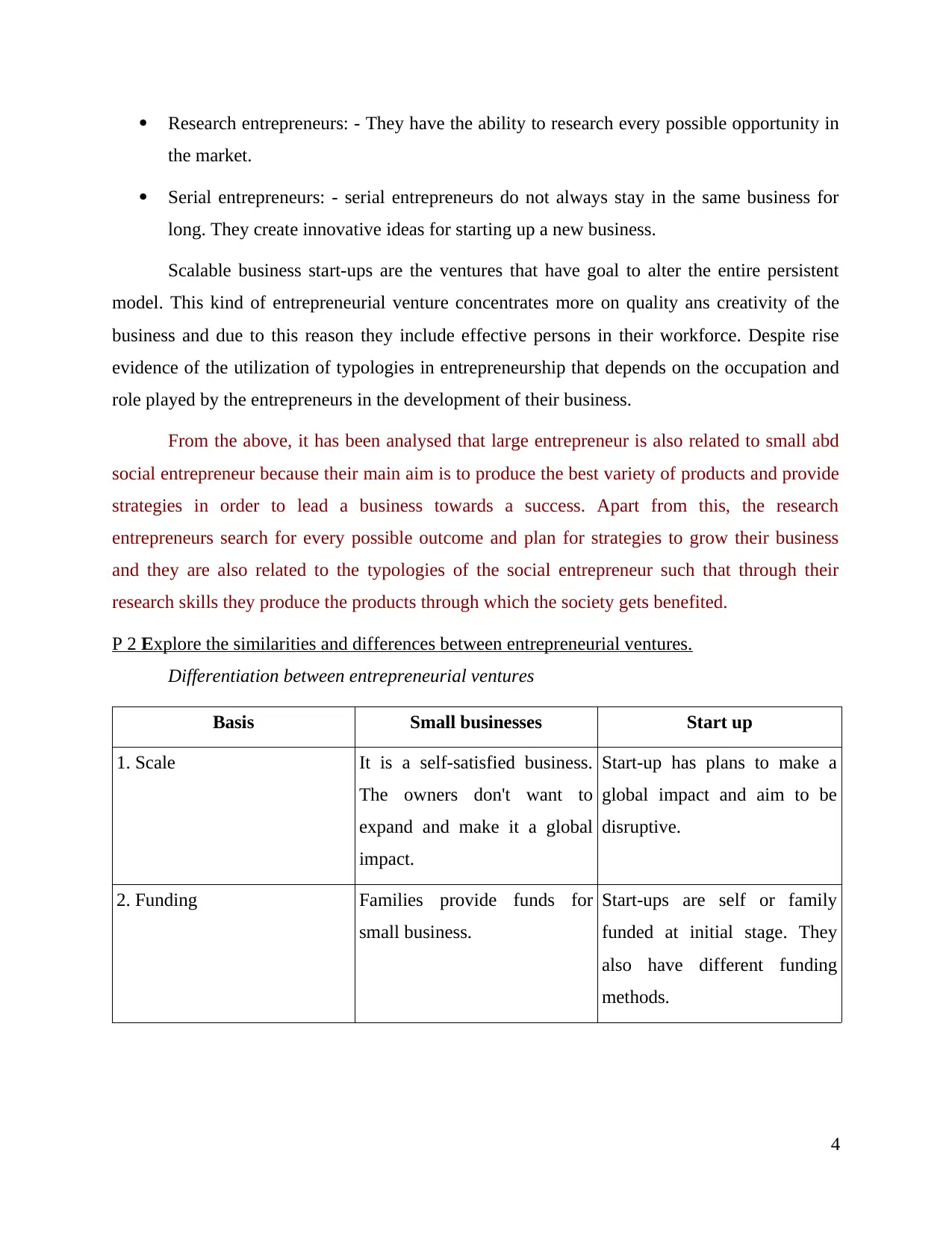
Research entrepreneurs: - They have the ability to research every possible opportunity in
the market.
Serial entrepreneurs: - serial entrepreneurs do not always stay in the same business for
long. They create innovative ideas for starting up a new business.
Scalable business start-ups are the ventures that have goal to alter the entire persistent
model. This kind of entrepreneurial venture concentrates more on quality ans creativity of the
business and due to this reason they include effective persons in their workforce. Despite rise
evidence of the utilization of typologies in entrepreneurship that depends on the occupation and
role played by the entrepreneurs in the development of their business.
From the above, it has been analysed that large entrepreneur is also related to small abd
social entrepreneur because their main aim is to produce the best variety of products and provide
strategies in order to lead a business towards a success. Apart from this, the research
entrepreneurs search for every possible outcome and plan for strategies to grow their business
and they are also related to the typologies of the social entrepreneur such that through their
research skills they produce the products through which the society gets benefited.
P 2 Explore the similarities and differences between entrepreneurial ventures.
Differentiation between entrepreneurial ventures
Basis Small businesses Start up
1. Scale It is a self-satisfied business.
The owners don't want to
expand and make it a global
impact.
Start-up has plans to make a
global impact and aim to be
disruptive.
2. Funding Families provide funds for
small business.
Start-ups are self or family
funded at initial stage. They
also have different funding
methods.
4
the market.
Serial entrepreneurs: - serial entrepreneurs do not always stay in the same business for
long. They create innovative ideas for starting up a new business.
Scalable business start-ups are the ventures that have goal to alter the entire persistent
model. This kind of entrepreneurial venture concentrates more on quality ans creativity of the
business and due to this reason they include effective persons in their workforce. Despite rise
evidence of the utilization of typologies in entrepreneurship that depends on the occupation and
role played by the entrepreneurs in the development of their business.
From the above, it has been analysed that large entrepreneur is also related to small abd
social entrepreneur because their main aim is to produce the best variety of products and provide
strategies in order to lead a business towards a success. Apart from this, the research
entrepreneurs search for every possible outcome and plan for strategies to grow their business
and they are also related to the typologies of the social entrepreneur such that through their
research skills they produce the products through which the society gets benefited.
P 2 Explore the similarities and differences between entrepreneurial ventures.
Differentiation between entrepreneurial ventures
Basis Small businesses Start up
1. Scale It is a self-satisfied business.
The owners don't want to
expand and make it a global
impact.
Start-up has plans to make a
global impact and aim to be
disruptive.
2. Funding Families provide funds for
small business.
Start-ups are self or family
funded at initial stage. They
also have different funding
methods.
4
⊘ This is a preview!⊘
Do you want full access?
Subscribe today to unlock all pages.

Trusted by 1+ million students worldwide
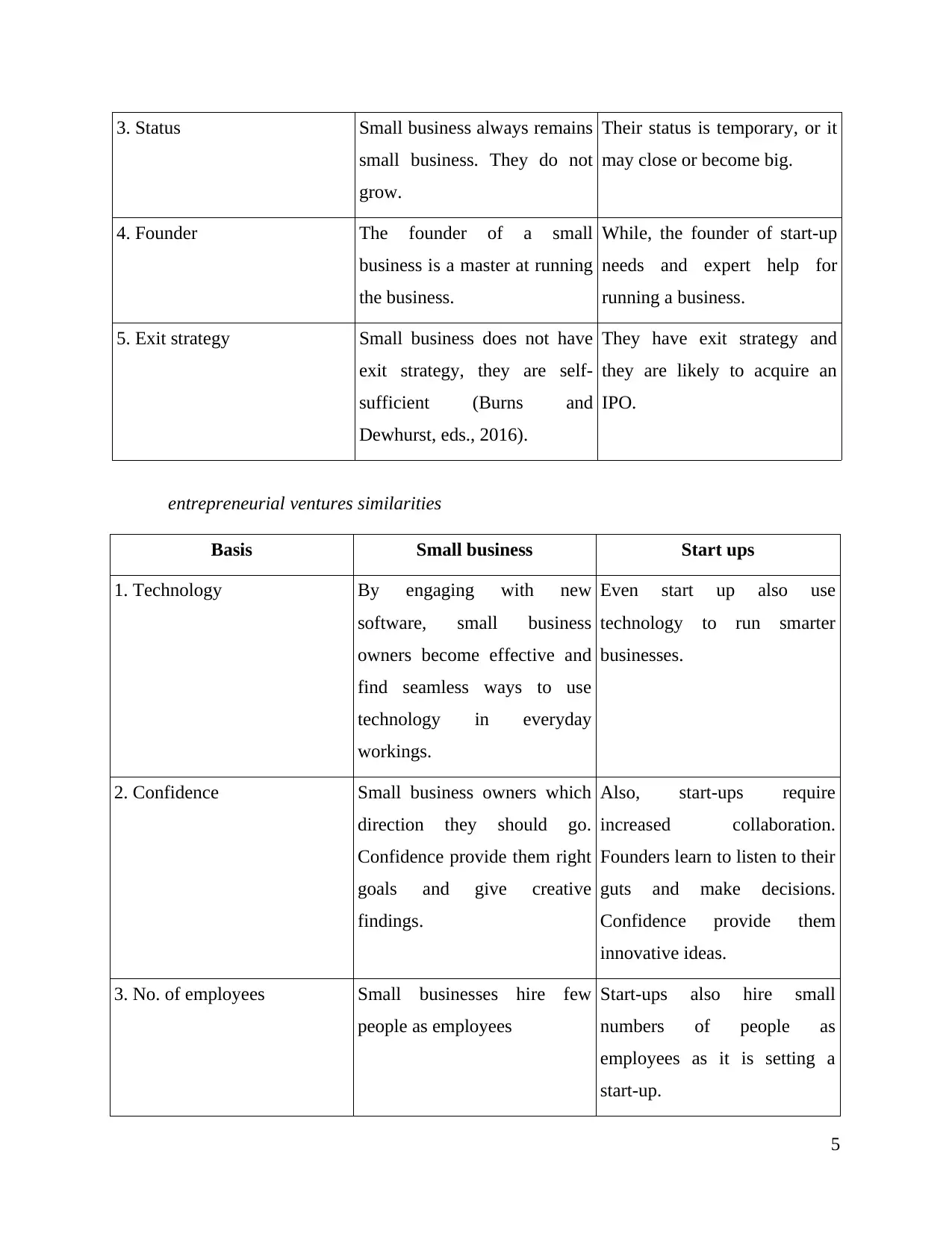
3. Status Small business always remains
small business. They do not
grow.
Their status is temporary, or it
may close or become big.
4. Founder The founder of a small
business is a master at running
the business.
While, the founder of start-up
needs and expert help for
running a business.
5. Exit strategy Small business does not have
exit strategy, they are self-
sufficient (Burns and
Dewhurst, eds., 2016).
They have exit strategy and
they are likely to acquire an
IPO.
entrepreneurial ventures similarities
Basis Small business Start ups
1. Technology By engaging with new
software, small business
owners become effective and
find seamless ways to use
technology in everyday
workings.
Even start up also use
technology to run smarter
businesses.
2. Confidence Small business owners which
direction they should go.
Confidence provide them right
goals and give creative
findings.
Also, start-ups require
increased collaboration.
Founders learn to listen to their
guts and make decisions.
Confidence provide them
innovative ideas.
3. No. of employees Small businesses hire few
people as employees
Start-ups also hire small
numbers of people as
employees as it is setting a
start-up.
5
small business. They do not
grow.
Their status is temporary, or it
may close or become big.
4. Founder The founder of a small
business is a master at running
the business.
While, the founder of start-up
needs and expert help for
running a business.
5. Exit strategy Small business does not have
exit strategy, they are self-
sufficient (Burns and
Dewhurst, eds., 2016).
They have exit strategy and
they are likely to acquire an
IPO.
entrepreneurial ventures similarities
Basis Small business Start ups
1. Technology By engaging with new
software, small business
owners become effective and
find seamless ways to use
technology in everyday
workings.
Even start up also use
technology to run smarter
businesses.
2. Confidence Small business owners which
direction they should go.
Confidence provide them right
goals and give creative
findings.
Also, start-ups require
increased collaboration.
Founders learn to listen to their
guts and make decisions.
Confidence provide them
innovative ideas.
3. No. of employees Small businesses hire few
people as employees
Start-ups also hire small
numbers of people as
employees as it is setting a
start-up.
5
Paraphrase This Document
Need a fresh take? Get an instant paraphrase of this document with our AI Paraphraser
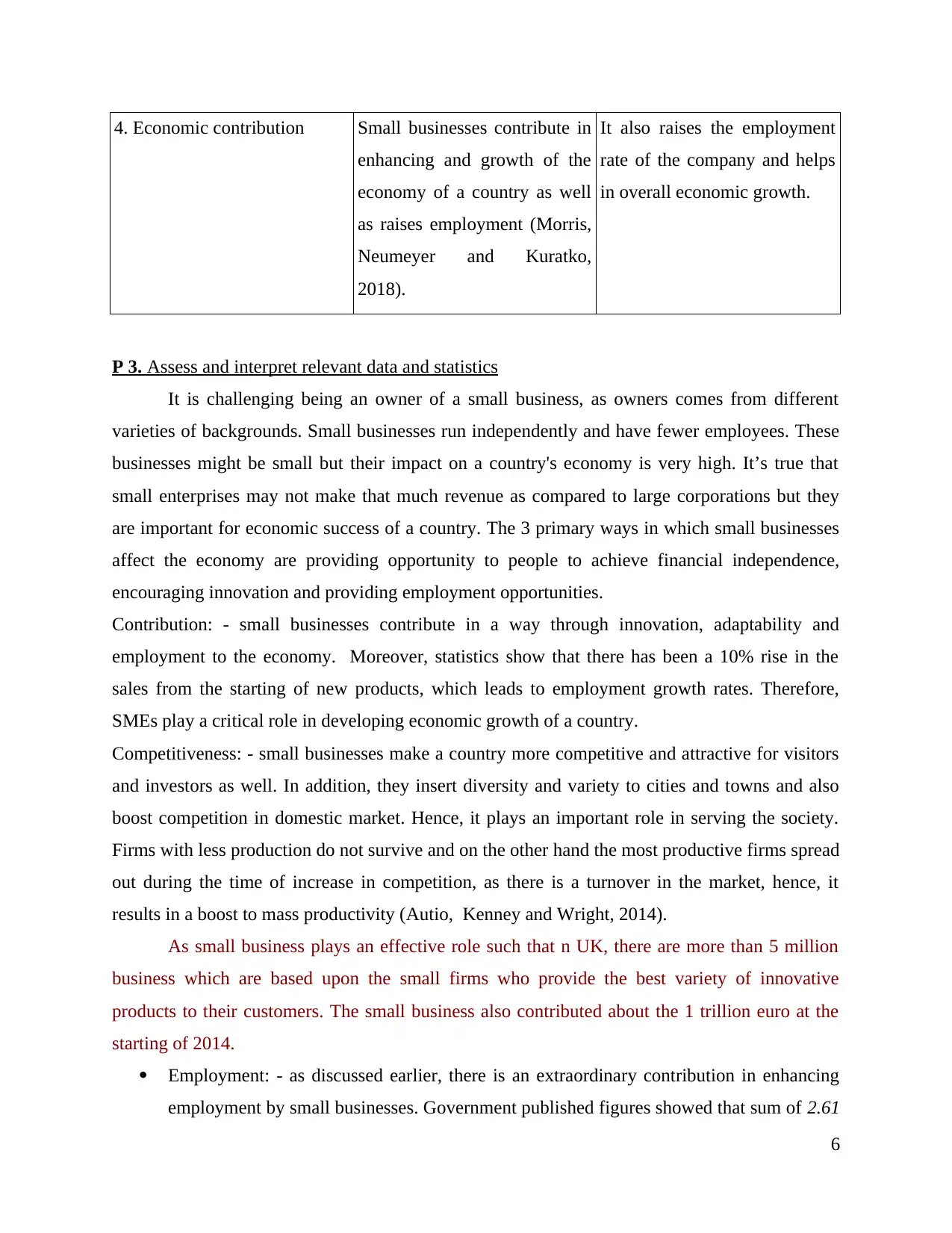
4. Economic contribution Small businesses contribute in
enhancing and growth of the
economy of a country as well
as raises employment (Morris,
Neumeyer and Kuratko,
2018).
It also raises the employment
rate of the company and helps
in overall economic growth.
P 3. Assess and interpret relevant data and statistics
It is challenging being an owner of a small business, as owners comes from different
varieties of backgrounds. Small businesses run independently and have fewer employees. These
businesses might be small but their impact on a country's economy is very high. It’s true that
small enterprises may not make that much revenue as compared to large corporations but they
are important for economic success of a country. The 3 primary ways in which small businesses
affect the economy are providing opportunity to people to achieve financial independence,
encouraging innovation and providing employment opportunities.
Contribution: - small businesses contribute in a way through innovation, adaptability and
employment to the economy. Moreover, statistics show that there has been a 10% rise in the
sales from the starting of new products, which leads to employment growth rates. Therefore,
SMEs play a critical role in developing economic growth of a country.
Competitiveness: - small businesses make a country more competitive and attractive for visitors
and investors as well. In addition, they insert diversity and variety to cities and towns and also
boost competition in domestic market. Hence, it plays an important role in serving the society.
Firms with less production do not survive and on the other hand the most productive firms spread
out during the time of increase in competition, as there is a turnover in the market, hence, it
results in a boost to mass productivity (Autio, Kenney and Wright, 2014).
As small business plays an effective role such that n UK, there are more than 5 million
business which are based upon the small firms who provide the best variety of innovative
products to their customers. The small business also contributed about the 1 trillion euro at the
starting of 2014.
Employment: - as discussed earlier, there is an extraordinary contribution in enhancing
employment by small businesses. Government published figures showed that sum of 2.61
6
enhancing and growth of the
economy of a country as well
as raises employment (Morris,
Neumeyer and Kuratko,
2018).
It also raises the employment
rate of the company and helps
in overall economic growth.
P 3. Assess and interpret relevant data and statistics
It is challenging being an owner of a small business, as owners comes from different
varieties of backgrounds. Small businesses run independently and have fewer employees. These
businesses might be small but their impact on a country's economy is very high. It’s true that
small enterprises may not make that much revenue as compared to large corporations but they
are important for economic success of a country. The 3 primary ways in which small businesses
affect the economy are providing opportunity to people to achieve financial independence,
encouraging innovation and providing employment opportunities.
Contribution: - small businesses contribute in a way through innovation, adaptability and
employment to the economy. Moreover, statistics show that there has been a 10% rise in the
sales from the starting of new products, which leads to employment growth rates. Therefore,
SMEs play a critical role in developing economic growth of a country.
Competitiveness: - small businesses make a country more competitive and attractive for visitors
and investors as well. In addition, they insert diversity and variety to cities and towns and also
boost competition in domestic market. Hence, it plays an important role in serving the society.
Firms with less production do not survive and on the other hand the most productive firms spread
out during the time of increase in competition, as there is a turnover in the market, hence, it
results in a boost to mass productivity (Autio, Kenney and Wright, 2014).
As small business plays an effective role such that n UK, there are more than 5 million
business which are based upon the small firms who provide the best variety of innovative
products to their customers. The small business also contributed about the 1 trillion euro at the
starting of 2014.
Employment: - as discussed earlier, there is an extraordinary contribution in enhancing
employment by small businesses. Government published figures showed that sum of 2.61
6
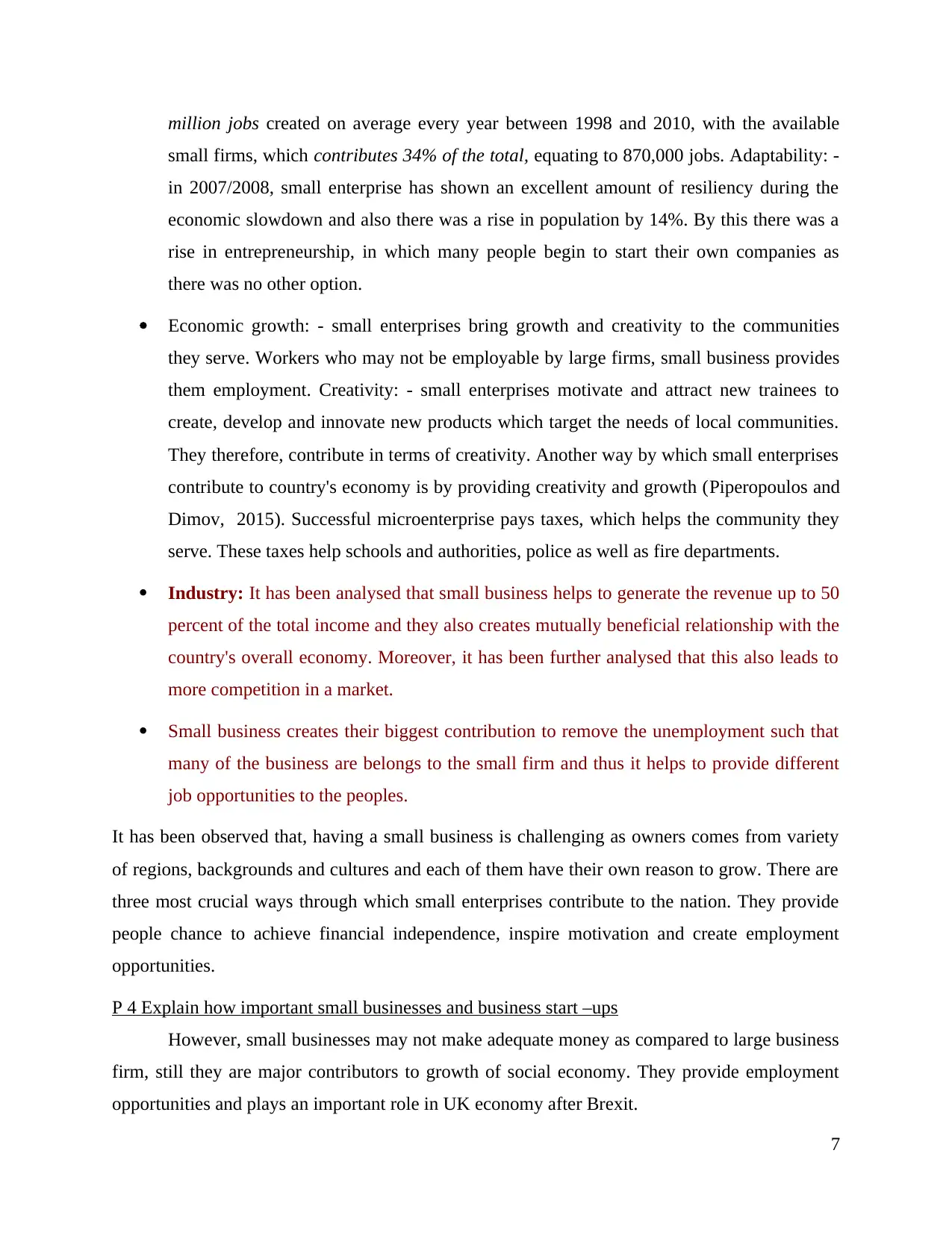
million jobs created on average every year between 1998 and 2010, with the available
small firms, which contributes 34% of the total, equating to 870,000 jobs. Adaptability: -
in 2007/2008, small enterprise has shown an excellent amount of resiliency during the
economic slowdown and also there was a rise in population by 14%. By this there was a
rise in entrepreneurship, in which many people begin to start their own companies as
there was no other option.
Economic growth: - small enterprises bring growth and creativity to the communities
they serve. Workers who may not be employable by large firms, small business provides
them employment. Creativity: - small enterprises motivate and attract new trainees to
create, develop and innovate new products which target the needs of local communities.
They therefore, contribute in terms of creativity. Another way by which small enterprises
contribute to country's economy is by providing creativity and growth (Piperopoulos and
Dimov, 2015). Successful microenterprise pays taxes, which helps the community they
serve. These taxes help schools and authorities, police as well as fire departments.
Industry: It has been analysed that small business helps to generate the revenue up to 50
percent of the total income and they also creates mutually beneficial relationship with the
country's overall economy. Moreover, it has been further analysed that this also leads to
more competition in a market.
Small business creates their biggest contribution to remove the unemployment such that
many of the business are belongs to the small firm and thus it helps to provide different
job opportunities to the peoples.
It has been observed that, having a small business is challenging as owners comes from variety
of regions, backgrounds and cultures and each of them have their own reason to grow. There are
three most crucial ways through which small enterprises contribute to the nation. They provide
people chance to achieve financial independence, inspire motivation and create employment
opportunities.
P 4 Explain how important small businesses and business start –ups
However, small businesses may not make adequate money as compared to large business
firm, still they are major contributors to growth of social economy. They provide employment
opportunities and plays an important role in UK economy after Brexit.
7
small firms, which contributes 34% of the total, equating to 870,000 jobs. Adaptability: -
in 2007/2008, small enterprise has shown an excellent amount of resiliency during the
economic slowdown and also there was a rise in population by 14%. By this there was a
rise in entrepreneurship, in which many people begin to start their own companies as
there was no other option.
Economic growth: - small enterprises bring growth and creativity to the communities
they serve. Workers who may not be employable by large firms, small business provides
them employment. Creativity: - small enterprises motivate and attract new trainees to
create, develop and innovate new products which target the needs of local communities.
They therefore, contribute in terms of creativity. Another way by which small enterprises
contribute to country's economy is by providing creativity and growth (Piperopoulos and
Dimov, 2015). Successful microenterprise pays taxes, which helps the community they
serve. These taxes help schools and authorities, police as well as fire departments.
Industry: It has been analysed that small business helps to generate the revenue up to 50
percent of the total income and they also creates mutually beneficial relationship with the
country's overall economy. Moreover, it has been further analysed that this also leads to
more competition in a market.
Small business creates their biggest contribution to remove the unemployment such that
many of the business are belongs to the small firm and thus it helps to provide different
job opportunities to the peoples.
It has been observed that, having a small business is challenging as owners comes from variety
of regions, backgrounds and cultures and each of them have their own reason to grow. There are
three most crucial ways through which small enterprises contribute to the nation. They provide
people chance to achieve financial independence, inspire motivation and create employment
opportunities.
P 4 Explain how important small businesses and business start –ups
However, small businesses may not make adequate money as compared to large business
firm, still they are major contributors to growth of social economy. They provide employment
opportunities and plays an important role in UK economy after Brexit.
7
⊘ This is a preview!⊘
Do you want full access?
Subscribe today to unlock all pages.

Trusted by 1+ million students worldwide
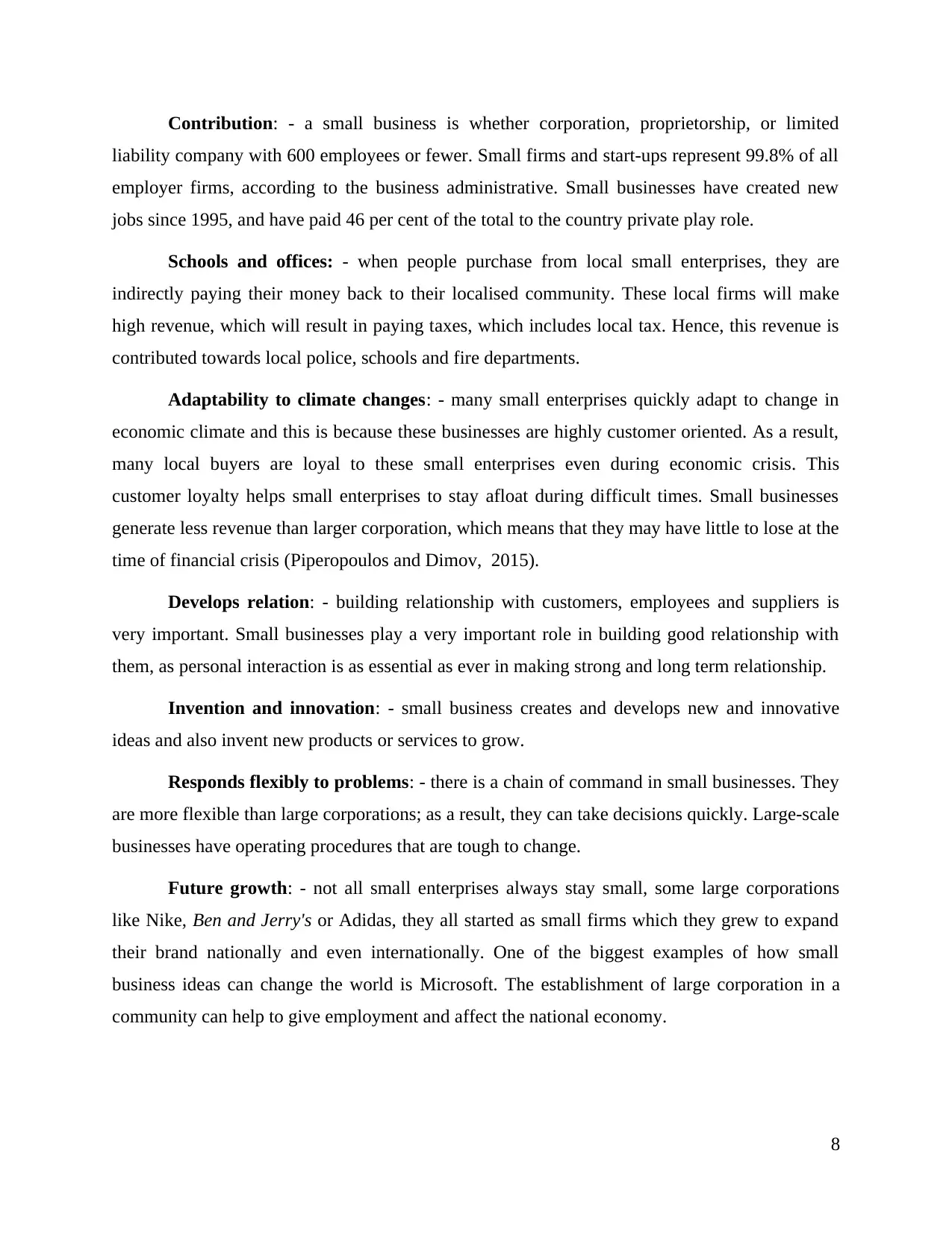
Contribution: - a small business is whether corporation, proprietorship, or limited
liability company with 600 employees or fewer. Small firms and start-ups represent 99.8% of all
employer firms, according to the business administrative. Small businesses have created new
jobs since 1995, and have paid 46 per cent of the total to the country private play role.
Schools and offices: - when people purchase from local small enterprises, they are
indirectly paying their money back to their localised community. These local firms will make
high revenue, which will result in paying taxes, which includes local tax. Hence, this revenue is
contributed towards local police, schools and fire departments.
Adaptability to climate changes: - many small enterprises quickly adapt to change in
economic climate and this is because these businesses are highly customer oriented. As a result,
many local buyers are loyal to these small enterprises even during economic crisis. This
customer loyalty helps small enterprises to stay afloat during difficult times. Small businesses
generate less revenue than larger corporation, which means that they may have little to lose at the
time of financial crisis (Piperopoulos and Dimov, 2015).
Develops relation: - building relationship with customers, employees and suppliers is
very important. Small businesses play a very important role in building good relationship with
them, as personal interaction is as essential as ever in making strong and long term relationship.
Invention and innovation: - small business creates and develops new and innovative
ideas and also invent new products or services to grow.
Responds flexibly to problems: - there is a chain of command in small businesses. They
are more flexible than large corporations; as a result, they can take decisions quickly. Large-scale
businesses have operating procedures that are tough to change.
Future growth: - not all small enterprises always stay small, some large corporations
like Nike, Ben and Jerry's or Adidas, they all started as small firms which they grew to expand
their brand nationally and even internationally. One of the biggest examples of how small
business ideas can change the world is Microsoft. The establishment of large corporation in a
community can help to give employment and affect the national economy.
8
liability company with 600 employees or fewer. Small firms and start-ups represent 99.8% of all
employer firms, according to the business administrative. Small businesses have created new
jobs since 1995, and have paid 46 per cent of the total to the country private play role.
Schools and offices: - when people purchase from local small enterprises, they are
indirectly paying their money back to their localised community. These local firms will make
high revenue, which will result in paying taxes, which includes local tax. Hence, this revenue is
contributed towards local police, schools and fire departments.
Adaptability to climate changes: - many small enterprises quickly adapt to change in
economic climate and this is because these businesses are highly customer oriented. As a result,
many local buyers are loyal to these small enterprises even during economic crisis. This
customer loyalty helps small enterprises to stay afloat during difficult times. Small businesses
generate less revenue than larger corporation, which means that they may have little to lose at the
time of financial crisis (Piperopoulos and Dimov, 2015).
Develops relation: - building relationship with customers, employees and suppliers is
very important. Small businesses play a very important role in building good relationship with
them, as personal interaction is as essential as ever in making strong and long term relationship.
Invention and innovation: - small business creates and develops new and innovative
ideas and also invent new products or services to grow.
Responds flexibly to problems: - there is a chain of command in small businesses. They
are more flexible than large corporations; as a result, they can take decisions quickly. Large-scale
businesses have operating procedures that are tough to change.
Future growth: - not all small enterprises always stay small, some large corporations
like Nike, Ben and Jerry's or Adidas, they all started as small firms which they grew to expand
their brand nationally and even internationally. One of the biggest examples of how small
business ideas can change the world is Microsoft. The establishment of large corporation in a
community can help to give employment and affect the national economy.
8
Paraphrase This Document
Need a fresh take? Get an instant paraphrase of this document with our AI Paraphraser
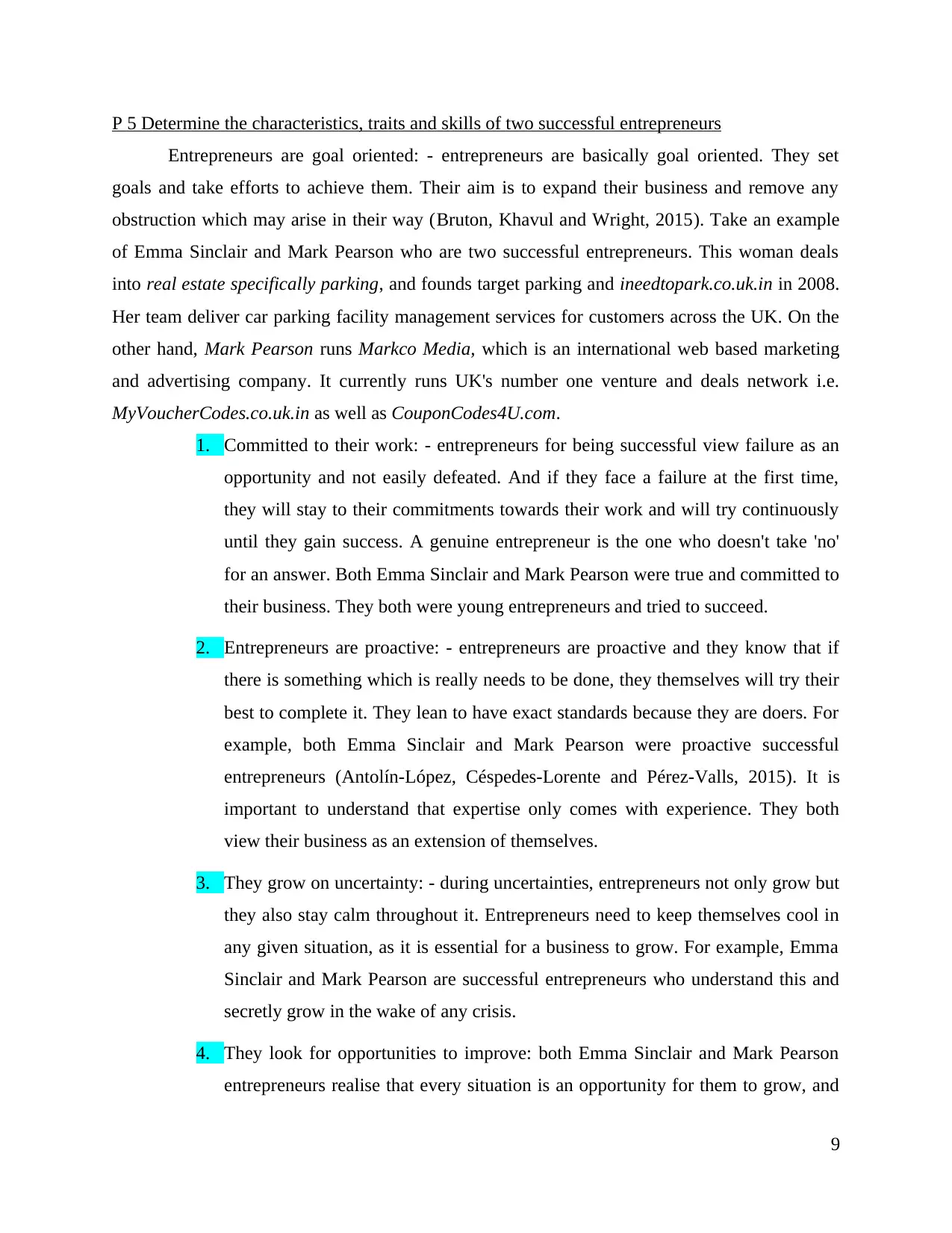
P 5 Determine the characteristics, traits and skills of two successful entrepreneurs
Entrepreneurs are goal oriented: - entrepreneurs are basically goal oriented. They set
goals and take efforts to achieve them. Their aim is to expand their business and remove any
obstruction which may arise in their way (Bruton, Khavul and Wright, 2015). Take an example
of Emma Sinclair and Mark Pearson who are two successful entrepreneurs. This woman deals
into real estate specifically parking, and founds target parking and ineedtopark.co.uk.in in 2008.
Her team deliver car parking facility management services for customers across the UK. On the
other hand, Mark Pearson runs Markco Media, which is an international web based marketing
and advertising company. It currently runs UK's number one venture and deals network i.e.
MyVoucherCodes.co.uk.in as well as CouponCodes4U.com.
1. Committed to their work: - entrepreneurs for being successful view failure as an
opportunity and not easily defeated. And if they face a failure at the first time,
they will stay to their commitments towards their work and will try continuously
until they gain success. A genuine entrepreneur is the one who doesn't take 'no'
for an answer. Both Emma Sinclair and Mark Pearson were true and committed to
their business. They both were young entrepreneurs and tried to succeed.
2. Entrepreneurs are proactive: - entrepreneurs are proactive and they know that if
there is something which is really needs to be done, they themselves will try their
best to complete it. They lean to have exact standards because they are doers. For
example, both Emma Sinclair and Mark Pearson were proactive successful
entrepreneurs (Antolín-López, Céspedes-Lorente and Pérez-Valls, 2015). It is
important to understand that expertise only comes with experience. They both
view their business as an extension of themselves.
3. They grow on uncertainty: - during uncertainties, entrepreneurs not only grow but
they also stay calm throughout it. Entrepreneurs need to keep themselves cool in
any given situation, as it is essential for a business to grow. For example, Emma
Sinclair and Mark Pearson are successful entrepreneurs who understand this and
secretly grow in the wake of any crisis.
4. They look for opportunities to improve: both Emma Sinclair and Mark Pearson
entrepreneurs realise that every situation is an opportunity for them to grow, and
9
Entrepreneurs are goal oriented: - entrepreneurs are basically goal oriented. They set
goals and take efforts to achieve them. Their aim is to expand their business and remove any
obstruction which may arise in their way (Bruton, Khavul and Wright, 2015). Take an example
of Emma Sinclair and Mark Pearson who are two successful entrepreneurs. This woman deals
into real estate specifically parking, and founds target parking and ineedtopark.co.uk.in in 2008.
Her team deliver car parking facility management services for customers across the UK. On the
other hand, Mark Pearson runs Markco Media, which is an international web based marketing
and advertising company. It currently runs UK's number one venture and deals network i.e.
MyVoucherCodes.co.uk.in as well as CouponCodes4U.com.
1. Committed to their work: - entrepreneurs for being successful view failure as an
opportunity and not easily defeated. And if they face a failure at the first time,
they will stay to their commitments towards their work and will try continuously
until they gain success. A genuine entrepreneur is the one who doesn't take 'no'
for an answer. Both Emma Sinclair and Mark Pearson were true and committed to
their business. They both were young entrepreneurs and tried to succeed.
2. Entrepreneurs are proactive: - entrepreneurs are proactive and they know that if
there is something which is really needs to be done, they themselves will try their
best to complete it. They lean to have exact standards because they are doers. For
example, both Emma Sinclair and Mark Pearson were proactive successful
entrepreneurs (Antolín-López, Céspedes-Lorente and Pérez-Valls, 2015). It is
important to understand that expertise only comes with experience. They both
view their business as an extension of themselves.
3. They grow on uncertainty: - during uncertainties, entrepreneurs not only grow but
they also stay calm throughout it. Entrepreneurs need to keep themselves cool in
any given situation, as it is essential for a business to grow. For example, Emma
Sinclair and Mark Pearson are successful entrepreneurs who understand this and
secretly grow in the wake of any crisis.
4. They look for opportunities to improve: both Emma Sinclair and Mark Pearson
entrepreneurs realise that every situation is an opportunity for them to grow, and
9

they constantly creating new and creative ideas. They both capable enough to
look at everything around them and always try to make themselves focus towards
their goals in an effort to grow their business.
5. Willing to take risk: - both Emma Sinclair and Mark Pearson doesn't ask question
about their success, that whether they will or not, they truly believe that they will
and it is a fact that they both succeed. They exudate this confidence at all stages
of their life. Hence, as a result they are always ready to take risk due to their
belief which prove that they will ultimately success.
6. Finance management: - to expand their business, entrepreneurs prepare
themselves financial causes which may occur in present and future as well. Both
Emma Sinclair and Mark Pearson keep a completely manage company's cash
flow, because it is the most essential aspect of the business.
7. Passionate and motivated: - passion is the most important attribute of the
successful entrepreneur. Both Emma Sinclair and Mark Pearson genuinely love to
work better and are always ready to work for extra hours to make their businesses
grow (Storey, 2016).
8. Creative: - successful entrepreneur are inbuilt creative. Entrepreneurship begins
with an idea, both Emma Sinclair and Mark Pearson were creative thinkers and
looked for opportunities to make new solutions.
9. Optimistic and future oriented: - entrepreneurs are innovative thinkers and they
constantly dream bigger as they always want to this world a better place. They
always see the brighter side of everything which them successful. Both Emma
Sinclair and Mark Pearson are optimistic and always focus on moving forward.
They both are future oriented, because as know what they exactly want to achieve
for future success. Having a strong vision helps them to accomplish their goals.
10. Skills: - entrepreneurs have a powerful communication skill to motivate their
workers and to effectively sell their products in the market. Both Emma Sinclair
and Mark Pearson are good at making the benefits of any situations.
10
look at everything around them and always try to make themselves focus towards
their goals in an effort to grow their business.
5. Willing to take risk: - both Emma Sinclair and Mark Pearson doesn't ask question
about their success, that whether they will or not, they truly believe that they will
and it is a fact that they both succeed. They exudate this confidence at all stages
of their life. Hence, as a result they are always ready to take risk due to their
belief which prove that they will ultimately success.
6. Finance management: - to expand their business, entrepreneurs prepare
themselves financial causes which may occur in present and future as well. Both
Emma Sinclair and Mark Pearson keep a completely manage company's cash
flow, because it is the most essential aspect of the business.
7. Passionate and motivated: - passion is the most important attribute of the
successful entrepreneur. Both Emma Sinclair and Mark Pearson genuinely love to
work better and are always ready to work for extra hours to make their businesses
grow (Storey, 2016).
8. Creative: - successful entrepreneur are inbuilt creative. Entrepreneurship begins
with an idea, both Emma Sinclair and Mark Pearson were creative thinkers and
looked for opportunities to make new solutions.
9. Optimistic and future oriented: - entrepreneurs are innovative thinkers and they
constantly dream bigger as they always want to this world a better place. They
always see the brighter side of everything which them successful. Both Emma
Sinclair and Mark Pearson are optimistic and always focus on moving forward.
They both are future oriented, because as know what they exactly want to achieve
for future success. Having a strong vision helps them to accomplish their goals.
10. Skills: - entrepreneurs have a powerful communication skill to motivate their
workers and to effectively sell their products in the market. Both Emma Sinclair
and Mark Pearson are good at making the benefits of any situations.
10
⊘ This is a preview!⊘
Do you want full access?
Subscribe today to unlock all pages.

Trusted by 1+ million students worldwide
1 out of 17
Related Documents
Your All-in-One AI-Powered Toolkit for Academic Success.
+13062052269
info@desklib.com
Available 24*7 on WhatsApp / Email
![[object Object]](/_next/static/media/star-bottom.7253800d.svg)
Unlock your academic potential
Copyright © 2020–2026 A2Z Services. All Rights Reserved. Developed and managed by ZUCOL.





